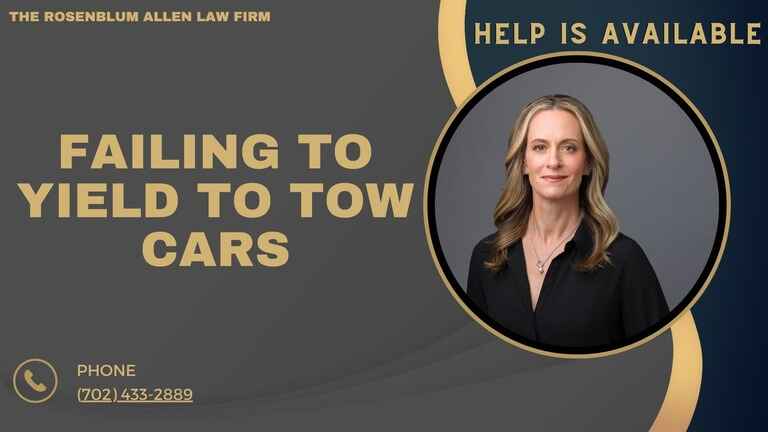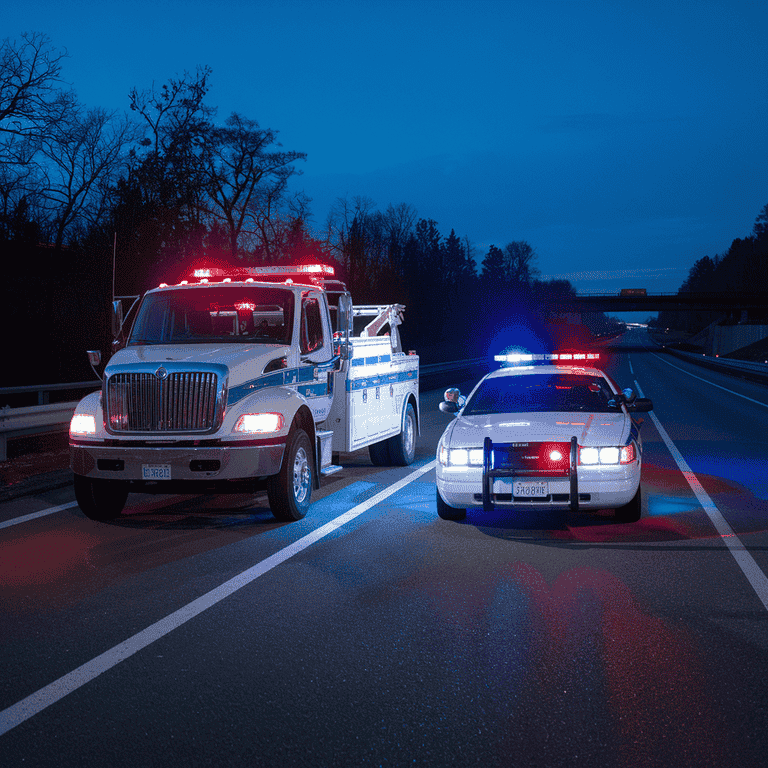Overview of Failing to Yield to Tow Cars
When you’re driving, knowing how to interact with tow cars is vital. Yielding means giving the right of way to another vehicle. This can prevent accidents and keep everyone safe. Unfortunately, many drivers fail to yield to tow cars, often leading to dangerous situations.

Definition of Yielding in Traffic
Yielding is a basic traffic rule. It means that if another vehicle is approaching or already on the road, you must slow down or stop to let them pass. This is particularly important with tow cars, as they often have flashing lights and may be on the scene of an accident or roadside assistance.
Importance of Yielding to Tow Cars
Tow trucks are typically involved in critical situations, such as helping stranded vehicles or clearing accidents. By yielding to these vehicles, you help promote the safety of everyone involved. Ignoring this rule can lead to serious accidents, injuries, and even legal consequences.
Common Scenarios Involving Tow Cars
Tow cars are often seen in various situations. Here are a few common scenarios:
- Assisting a disabled vehicle on the side of the road.
- Responding to accidents to remove vehicles from the road.
- Providing emergency roadside services to drivers.
Understanding these scenarios can help you recognize when you need to yield.
Understanding Tow Car Regulations
Tow vehicles are subject to specific regulations that vary by state. Familiarizing yourself with these rules can enhance your safety on the road.
Legal Definitions of Tow Cars
Tow cars refer to vehicles specifically designed for towing other vehicles. These can include:
- Flatbed tow trucks
- Hook-and-chain tow trucks
- Wheel-lift tow trucks
Each type serves a different purpose, but all must adhere to specific road safety regulations.
Types of Tow Cars and Their Purposes
Different tow vehicles serve various functions. Here’s a brief overview of common types:
| Type of Tow Car | Purpose |
|---|---|
| Flatbed Tow Truck | Transports vehicles on a flat surface |
| Hook-and-Chain Truck | Tows vehicles using chains and hooks |
| Wheel-Lift Tow Truck | Lifts vehicles from the wheels |
Knowing the type of tow truck and its function can prepare you to react appropriately when you see one on the road.
State-Specific Regulations Regarding Tow Vehicles
Each state has its own rules regarding tow vehicles. It’s essential to be aware of these laws, especially if you’re driving in a new area. For example, many states require drivers to slow down or move over when they see a tow truck with flashing lights. Failing to do so can lead to fines or even points on your driving record.

Common Causes of Failing to Yield to Tow Cars
Understanding the reasons behind why drivers fail to yield can help prevent future incidents.
Driver Distraction
One of the leading causes of failing to yield is distraction. Drivers may be:
- Using their phones
- Engaged in conversations
- Focusing on other tasks while driving
Poor Visibility Conditions
Visibility can be a significant factor. Conditions such as fog, rain, or nighttime driving can obscure the presence of tow trucks. This can lead to misunderstandings about when to yield.
Misunderstanding of Traffic Laws
Some drivers may not fully understand the laws regarding yielding to tow vehicles. They might mistakenly believe that tow trucks don’t require special attention.
Inadequate Signage and Warnings
In some cases, the absence of clear signage can contribute to confusion. If drivers are not aware that they should yield to tow trucks, they may inadvertently break this important rule.
By being aware of these common causes, you can better navigate the roads and make safe decisions when encountering tow vehicles.
Consequences of Failing to Yield to Tow Cars
Not yielding to tow cars can have serious repercussions. Understanding these consequences can help you appreciate the importance of following traffic laws.
Legal Ramifications
Failing to yield can lead to legal trouble. Here are some potential legal issues you may face:
- Traffic Citations: Officers may issue tickets for not yielding. This could come with fines that vary by state.
- Increased Insurance Rates: A ticket for failing to yield can raise your insurance premiums. Insurers may view you as a higher risk.
- Criminal Charges: In severe cases, such as accidents that result in injuries, you might face criminal charges.
Fines and Penalties
The financial impact of failing to yield can be significant. Here’s a breakdown of possible penalties:
| Violation | Potential Fine |
|---|---|
| Failing to Yield | $100 – $300 |
| Reckless Driving | $300 – $1,000 |
| Criminal Charges | Varies by severity |
These fines can quickly accumulate, making it essential to obey traffic laws.
Potential for Criminal Charges
In serious situations, failing to yield can lead to criminal charges. If your actions result in injuries or fatalities, you could face severe consequences. This may include:
- Misdemeanor Charges: For minor injuries, you might receive a misdemeanor charge.
- Felony Charges: If someone is seriously injured or killed, charges could escalate to a felony. This can result in significant penalties, including jail time.
Impact on Driving Record
Your driving record is crucial for insurance and legal purposes. Failing to yield can lead to points on your record. Here’s how it works:
- Points System: Many states use a points system to track driving violations. Accumulating points can lead to higher insurance rates.
- License Suspension: If you receive too many points in a short time, you risk having your license suspended. This can create significant inconvenience and expense.
Understanding these consequences emphasizes why it’s vital to yield to tow cars and follow traffic laws.

Safety Risks Associated with Failing to Yield
Not yielding to tow cars creates safety risks for everyone on the road. These risks extend beyond the involved drivers.
Increased Risk of Accidents
When drivers fail to yield, accidents can happen. Here are some ways this can occur:
- Collisions with Tow Trucks: Ignoring a tow truck can lead to crashes. This can cause injuries not just to the involved drivers but also to passengers.
- Secondary Accidents: An accident involving a tow truck can lead to additional collisions. Other drivers may react unpredictably, resulting in a chain reaction of crashes.
Injury Risks for Drivers and Passengers
The injuries from accidents involving tow trucks can be severe. Here are some common types of injuries:
- Whiplash: Sudden stops or impacts can cause neck injuries.
- Fractures: Collisions can lead to broken bones.
- Traumatic Brain Injuries: Head injuries can occur if there is a significant impact.
These injuries can result in long-term medical issues and costly treatments.
Risks for Tow Truck Operators
Tow truck drivers also face dangers when drivers fail to yield. Here’s how:
- Exposure to Traffic: Tow truck operators often work in busy environments. They must be alert to incoming traffic, which can be unpredictable.
- Injury Risks: If another driver fails to yield, tow truck operators may be injured while performing their duties. This can lead to severe physical harm and emotional distress.
Consequences for Bystanders
Bystanders can also be affected by failures to yield. Here are some potential impacts:
- Injury Risks: Innocent bystanders could get caught in the crossfire of an accident.
- Emotional Trauma: Witnessing an accident can lead to emotional and psychological challenges for those nearby.
The broader implications of failing to yield highlight the importance of safety for all road users.
What to Do If You Encounter a Tow Car
When you see a tow truck, knowing how to react is vital. Here are some best practices for safely navigating situations involving tow cars.
Best Practices for Approaching Tow Trucks
When approaching a tow truck, keep these tips in mind:
- Slow Down: Reduce your speed as you approach a tow truck. This allows you to react quickly if necessary.
- Change Lanes: If it’s safe, move to another lane to give the tow truck space. This minimizes the risk of an accident.
- Be Alert: Stay focused and watch for any sudden movements from the tow truck or other vehicles.
Understanding Signals and Lights Used by Tow Trucks
Tow trucks use specific signals to alert other drivers. Familiarize yourself with these indicators:
- Flashing Lights: Most tow trucks have flashing lights. These signal that the vehicle is on an emergency call.
- Traffic Cones: Tow trucks often set up cones to mark their working area. Always give these areas extra space.
Recognizing these signals helps you react appropriately when you encounter a tow truck.
Legal Obligations When Encountering a Tow Vehicle
As a driver, you have legal responsibilities when you see a tow truck. Here are key obligations to keep in mind:
- Yield Right of Way: Always yield to tow trucks, especially if they have flashing lights.
- Move Over: In many states, laws require drivers to move over when a tow truck is on the side of the road. This helps create a safe environment for the tow operator.

Insurance Considerations
Navigating insurance after an accident with a tow car can feel overwhelming. Understanding your coverage and what to expect can make the process smoother. Here’s what you need to know.
Understanding Your Insurance Coverage
Before you find yourself in an accident, it’s wise to know what your insurance covers. Here are key points to keep in mind:
- Liability Coverage: This is essential. It helps pay for damages to other vehicles if you are at fault. Make sure you have adequate limits.
- Collision Coverage: This helps pay for damages to your own vehicle after an accident, regardless of fault. It can be especially useful in tow car incidents.
- Comprehensive Coverage: This protects you from non-collision events, like theft or vandalism. While it might not apply directly to a tow truck accident, it’s good to have.
Filing an Insurance Claim After an Accident
If you’re involved in an accident with a tow truck, filing a claim is vital. Here’s a step-by-step guide:
- Contact Your Insurance Company: Notify them of the accident as soon as possible. Provide all necessary details.
- Document Everything: Collect evidence from the scene. Photos, witness statements, and a police report can be invaluable.
- Fill Out Claim Forms: Your insurer will provide forms to fill out. Be thorough and accurate in your descriptions.
What to Expect During the Claims Process
After filing your claim, you’ll go through several steps. Here’s what typically happens:
- Claim Review: Your insurance company will review all the information you provided.
- Investigation: They may conduct an investigation, which could involve speaking to witnesses and reviewing police reports.
- Settlement Offer: Once everything is assessed, your insurer will make a settlement offer. You can accept or negotiate if you feel it’s too low.
Legal Considerations
Sometimes, accidents lead to legal complications. Knowing when to seek legal help can make a difference.
When to Hire an Attorney
Not every accident requires a lawyer, but certain situations do. Here are instances when you should think about legal representation:
- Serious Injuries: If you or others sustained significant injuries, a lawyer can help ensure you receive fair compensation.
- Disputed Liability: If there’s disagreement over who was at fault, having a lawyer can clarify your case.
- Insurance Issues: If your insurance company denies your claim or offers an inadequate settlement, legal support can help you fight back.
How an Attorney Can Help
An attorney can provide several benefits in an accident case:
- Knowledge: They understand the legal system and can guide you through the process.
- Negotiation Skills: Lawyers are skilled negotiators. They can advocate for a better settlement on your behalf.
- Representation in Court: If your case goes to court, having an attorney ensures you have professional representation.

Breaking It Down for You
Yielding to tow cars is not just a legal requirement; it’s a matter of safety for everyone on the road. Tow trucks often operate in high-stress environments, and their drivers work hard to assist others. By understanding the risks of failing to yield and knowing how to navigate the aftermath of an accident, you can contribute to safer driving conditions.
Always stay alert, follow traffic laws, and practice defensive driving techniques. In case of an accident, know your insurance options and when to seek legal assistance. Together, we can create a safer community for all road users, including tow truck operators and fellow drivers. Your actions on the road can make a significant difference. Stay safe!

Frequently Asked Questions
What should I do immediately after an accident with a tow truck?
Immediately ensure everyone’s safety and call for medical help if needed. Gather information, such as names and contact details of witnesses, take photos of the scene, and exchange insurance details with the other party.
How do I know if I’m at fault in an accident involving a tow truck?
Fault can depend on various factors, such as traffic laws, road conditions, and witness accounts. Your insurance company and local authorities may conduct an investigation to determine liability.
Can I claim compensation for damages if I was partly at fault?
Yes, many states allow for comparative negligence. This means you may still receive compensation, but the amount may be reduced based on your level of fault in the accident.
What if the tow truck driver was not in their vehicle during the accident?
If the tow truck was parked or unattended and you hit it, liability may still depend on various factors, including whether the tow truck was parked legally or if there were any warning signals present.
How can I obtain a copy of the police report after the accident?
You can usually request a copy of the police report from the local police department or the agency that responded to the accident. There may be a small fee associated with obtaining the report.
What if my insurance claim is denied?
If your claim is denied, review the denial letter for specific reasons and gather any additional evidence that supports your case. You can appeal the decision through your insurance company’s dispute process or consult an attorney for assistance.
How long do I have to file a claim after an accident with a tow truck?
The timeframe can vary by state, typically ranging from a few months to a few years. It’s important to check your state’s statute of limitations for personal injury or property damage claims to ensure you file in time.
What are the penalties for failing to yield to a tow truck?
Penalties can vary by state but often include fines, points on your driving record, and increased insurance premiums. In severe cases, it could lead to more serious consequences if an accident occurs.
Will my insurance rates go up after an accident involving a tow truck?
It’s possible that your rates may increase after an accident, especially if you are found to be at fault. Each insurance company has its policies regarding rate adjustments after claims.
How can I prevent accidents involving tow trucks in the future?
Stay aware of your surroundings, follow traffic laws, and give tow trucks the right of way. Always be cautious around roadside assistance vehicles, as they may be working to help others in distress.

Glossary
Accident Report: A formal document created by law enforcement that details the circumstances of a traffic accident, including involved parties, damage, and witness statements.
Comparative Negligence: A legal doctrine that allocates fault in an accident based on the percentage of blame assigned to each party involved, affecting compensation amounts.
Fault: The legal determination of responsibility for an accident, which can be total or partial, depending on the actions of the involved parties.
Insurance Claim: A request made to an insurance company for compensation or coverage for damages or losses incurred due to an accident.
Liability: Legal responsibility for the consequences of an action or inaction, often determining who is at fault in an accident.
Negligence: A failure to take proper care in doing something, which results in damage or injury to another party, often forming the basis for liability claims.
Personal Injury: Physical or psychological harm suffered by an individual due to the negligence or wrongful conduct of another party, often leading to legal claims for compensation.
Police Report: A record prepared by police officers that documents details of a traffic incident, including involved parties, injuries, and evidence collected at the scene.
Statute of Limitations: The time limit set by law for filing a legal claim or lawsuit after an incident, which varies depending on the type of claim and jurisdiction.
Tow Truck: A specialized vehicle designed to transport other vehicles, often used in situations where a vehicle is disabled or needs to be removed from a roadway.
Yield: To give way to another vehicle or pedestrian, often indicated by traffic signs or signals; failing to yield can result in accidents and legal consequences.
Witness Statement: An account provided by individuals who observed the accident, detailing what they saw and heard, which can be used as evidence in legal proceedings.

Additional Resources for You
Our lead attorney, Molly Rosenblum, Esq., has created a collection of valuable resources to support you during your time of need. These resources provide detailed insights into various traffic violations and potential defenses:
Las Vegas Traffic Ticket Attorney: Learn how a traffic ticket attorney can help you navigate the complexities of traffic law.
Aggressive Driving Ticket: Understand the implications of an aggressive driving ticket and how to build a strong defense.
Driving Too Slowly Ticket: Get insights into the consequences of a ticket for driving too slowly and learn potential defense strategies.
Failing to Yield to Traffic Incidents: Understand the nuances of failing to yield to traffic incidents and how to challenge such citations.
Parking Too Far From Curb Ticket: Learn about the implications of parking too far from the curb and how to contest such a citation.
Reckless Driving Ticket: Discover the potential consequences of a reckless driving ticket and how you can mount a robust defense.
Speeding Ticket: Understand the ramifications of a speeding ticket and explore potential defense strategies.

A Special Message from Our Lead Attorney

Molly Rosenblum
Dear Reader,
Thank you for reviewing the resources I’ve created to help provide some clarity and guidance on various traffic violations.
These resources were designed with you in mind to help you understand the complexities of traffic law and your rights when facing a traffic ticket.
I understand that dealing with traffic tickets can be stressful and sometimes confusing.
Please remember that you’re not alone in this process. My team and I at The Rosenblum Allen Law Firm are here to provide the guidance and support you need.
If you have further questions or want to explore your specific situation in greater detail, I invite you to schedule a consultation.
You can call (702) 433-2889 at your earliest convenience. We’re here to listen, understand your situation, and discuss potential strategies to resolve your traffic ticket effectively.
Remember, it’s crucial to protect your rights and driving record. Don’t hesitate to reach out for the legal assistance you need. We look forward to speaking with you soon.
Warm Regards,
Molly Rosenblum, Esq.




